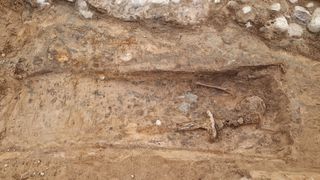ramonmercado
CyberPunk
- Joined
- Aug 19, 2003
- Messages
- 58,830
- Location
- Eblana
A Noble of the Kalmar Union, buried with big sword.

Archaeologists think the sword in the grave signifies that the man buried there was a noble; and they suggest he may have been a supporter of the Kalmar Union of Sweden, Denmark and Norway. (Image credit: Copyright Kulturmiljö Halland, Stiftelsen Hallands länsmuseer)
Archaeologists in Sweden have discovered the medieval burial of an extremely tall man who was buried with a long sword — one that was nearly two-thirds of his height — and may have been a nobleman who supported the region's ill-fated union with Denmark and Norway.
The sword, which is over 4 feet (1.3 meters) long, seems to have been inlaid with a different metal to form small Christian crosses, excavation leader Johan Klange, an archaeologist with the Halland Cultural Environment, an agency of the local government, told Live Science.
Even taller than the sword was the man in the grave. Klange said he stood about 6 feet, 3 inches (1.9 meters) tall — an impressive height for the turn of the 16th century, when the average male height in Sweden was about 5 feet, 5 inches (1.65 m), according to experts.
Archaeologists found the burial during excavations of the "Little Square" — "Lilla Torg" in Swedish — at the center of the city of Halmstad, on the west coast of Sweden near Denmark. The grave of the tall man was the most prominent found in excavations of the Franciscan friary at the site, which was active from 1494 until it was destroyed in 1531 during the Protestant Reformation, Klange said.
The sword buried alongside the man was the only grave good found among 49 graves at the site and may have signified that the man was a member of the high nobility. The archeologists think the man may have been a wealthy supporter of the Kalmar Union, in which a single king ruled Sweden, Denmark and Norway between roughly 1397 and 1523.
"We hypothesize that he was part of the high nobility of the Kalmar Union, and may have owned property in both Sweden and Denmark," Klange said. "These people became very, very powerful."
https://www.livescience.com/archaeo...and-his-4-foot-long-sword-unearthed-in-sweden
Medieval grave of 'very, very powerful' man and his 4-foot-long sword unearthed in Sweden
By Tom Metcalf published about 17 hours ago
Archaeologists think the man buried in the grave may have been a wealthy supporter of the Kalmar Union in which a single monarch united the kingdoms of Denmark, Sweden and Norway.
Archaeologists think the sword in the grave signifies that the man buried there was a noble; and they suggest he may have been a supporter of the Kalmar Union of Sweden, Denmark and Norway. (Image credit: Copyright Kulturmiljö Halland, Stiftelsen Hallands länsmuseer)
Archaeologists in Sweden have discovered the medieval burial of an extremely tall man who was buried with a long sword — one that was nearly two-thirds of his height — and may have been a nobleman who supported the region's ill-fated union with Denmark and Norway.
The sword, which is over 4 feet (1.3 meters) long, seems to have been inlaid with a different metal to form small Christian crosses, excavation leader Johan Klange, an archaeologist with the Halland Cultural Environment, an agency of the local government, told Live Science.
Even taller than the sword was the man in the grave. Klange said he stood about 6 feet, 3 inches (1.9 meters) tall — an impressive height for the turn of the 16th century, when the average male height in Sweden was about 5 feet, 5 inches (1.65 m), according to experts.
Archaeologists found the burial during excavations of the "Little Square" — "Lilla Torg" in Swedish — at the center of the city of Halmstad, on the west coast of Sweden near Denmark. The grave of the tall man was the most prominent found in excavations of the Franciscan friary at the site, which was active from 1494 until it was destroyed in 1531 during the Protestant Reformation, Klange said.
The sword buried alongside the man was the only grave good found among 49 graves at the site and may have signified that the man was a member of the high nobility. The archeologists think the man may have been a wealthy supporter of the Kalmar Union, in which a single king ruled Sweden, Denmark and Norway between roughly 1397 and 1523.
"We hypothesize that he was part of the high nobility of the Kalmar Union, and may have owned property in both Sweden and Denmark," Klange said. "These people became very, very powerful."
https://www.livescience.com/archaeo...and-his-4-foot-long-sword-unearthed-in-sweden

